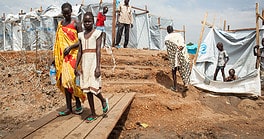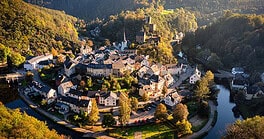Europe's dominance of the World Happiness ranking was unshaken by the global pandemic.
INTRODUCTION
European countries dominated the ranking of the annual World Happiness Report since it was released for the first time in 2013. Then, in 2020, the Covid-19 pandemic struck—and not much changed.
We know what you are thinking. What does it even mean to be a happy country in a world still rattled by Covid-19 and, now, the shock of the war in Ukraine? While the survey was conducted before the start of the conflict, it does confirm last year’s findings when it comes to the pandemic: irrespective of how big or small the toll on people’s lives, the coronavirus outbreak seems to have done little to change the rankings in comparison to past editions of the survey, and not just when it comes to the countries in the top positions of the index.
It is often said that even in the worst of times there is joy to be found, and the report—which was compiled by the Sustainable Development Solutions Network at the United Nations in collaboration with the Gallup World Poll—backs this adage with plenty of data. Emotions, indeed, changed and worsened at times, with people saying they were worried or sad especially during lockdowns. Yet, there has been incredible resilience in how they rated their wellbeing and quality of life.
The reason lies in the presence of different types of support systems that can soften the impact of certain shocks. That is particularly true for most European nations which, along with being rich, tend to value social connections and equality, and have implemented strong domestic systems of social protection.
High GDP per capita, social support in times of need, absence of corruption in government, healthy life expectancy, freedom to make life choices, generosity or charity towards others: these are the six key variables that the researchers use in their report to evaluate life satisfaction. The European nations topping the happiness ranking do exceptionally well in all of these categories. Even Covid-19 could not change that, and the five happiest nations in Europe are also the happiest nations in the world as a whole.
#5 | NETHERLANDS
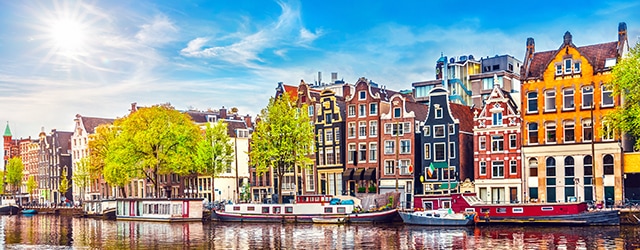
Click To View GDP & Economic Data
A fixture of the happiness report’s top 10, the Netherlands maintains its number five position in the ranking. That, of course, does not mean that the Dutch have not had their share of coronavirus-induced problems.
When the pandemic broke early in 2020, the government launched a series of both voluntary and involuntary so-called “intelligent lockdown measures” aimed at minimizing new infections while keeping the economy running as much as possible. They worked—at least for a while. As the year progressed, against a backdrop of rising infections and newly introduced months-long lockdowns, people started growing impatient. When, in January last year, the government imposed the first nationwide curfew since World War II, violent demonstrations exploded in the streets of all major cities.
There are several reasons, however, why these incidents did not weigh too heavily on the country’s standing in the ranking. Not only they have involved a small fraction of the population, but today the Dutch score well when it comes to social connections and institutional trust, and remain more affluent, educated and freer to make their own life choices than at any point in their country’s history.
#4 | SWITZERLAND
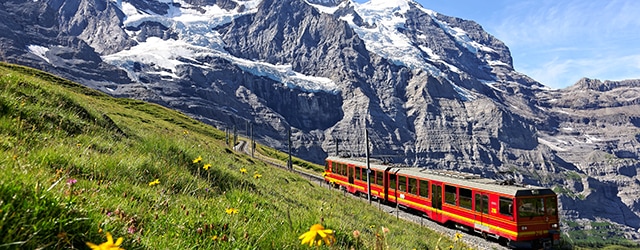
Click To View GDP & Economic Data
After conquering the first spot in the 2015’s World Happiness Report, Switzerland slowly started losing ground until, three years ago, it reached its lowest position ever in the ranking at sixth. While the researchers point out that people’s happiness levels tend to be closer to one another in the top-ranking countries, Switzerland then managed to take back the third spot in the list and maintain it during a very difficult 2020. It does, however, lose one position in the edition of the report, which is less due to the Swiss feeling crankier and more to improvements in the overall score of other top-performing countries.
Fear not, Switzerland remains a country that seems to have been created precisely for the pursuit of a happy life. It can boast postcard landscapes and clean air, state of the art infrastructure and education services, both great wealth and equal distribution of resources. Making chocolate and cheese and not war helps too: Switzerland is notoriously neutral and has not been involved in a war since 1847. Or has it? In a sharp break with its past, Switzerland joined the European Union in imposing sanctions on Russia for its invasion of Ukraine.
#3 | ICELAND
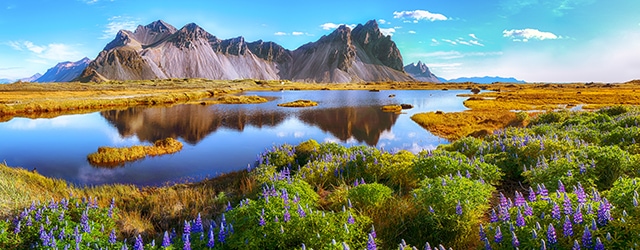
Click To View GDP & Economic Data
Iceland routinely tops a wide variety of quality of life rankings. Chosen by both the World Economic Forum as the best country in the world for gender equality and the Institute for Economics and Peace as the most peaceful for more than 10 years in a row, this republic of less than 350,000 is also a shining example of how to handle a pandemic: despite a recent spike due to the Omicron variant, Iceland entered 2022 with just 37 official deaths due to Covid-19.
What did it do right? In the early stages of the pandemic, health officials rushed to contain the spread of the coronavirus earlier than most countries through aggressive testing and contact tracing. In the meantime, the government guaranteed the payment of the full salary to those suspected of being infected—in other words, Icelanders did not have to worry about losing their wages and stayed at home when they needed to. How did they keep busy? Making babies, apparently: births rose in most Nordic countries in 2020 and in all of them in 2022, but especially in Iceland, where they climbed 7.5%.
Iceland thus gains one position in the happiness ranking—and with its enchanting landscapes, free healthcare and education, and extraordinary collective sense of trust and community, it is no surprise that once again it came so close to the top of the UN index.
#2 | DENMARK
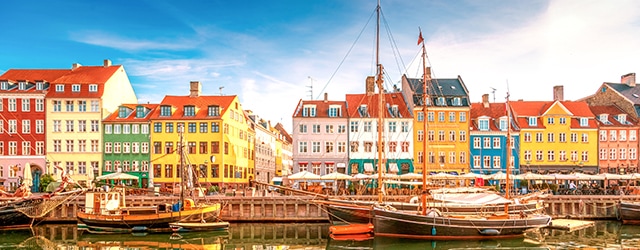
Click To View GDP & Economic Data
Coming in runner-up for the fourth year in a row, Denmark topped the list in the first report, in 2012, and again in 2013 and 2016. Nordic countries, the authors of the report have noted in the past, share similar social and political models and values. That explains why all of them feature among the 10 happiest nations in the world and why they often swap places on the happiness podium.
That’s not to say that, faced with the unprecedented threat of the pandemic, these countries followed similar and equally successful trajectories in containing it. Denmark did so well during Europe’s first wave of Covid-19 that, in the springtime of 2020, its chief epidemiologist predicted that a second wave was “very unlikely”. As he soon learned, he was wrong.
Today, however, with roughly 85% of the population who have received at least one vaccination shot and nearly two-thirds who have received three, life is slowly getting back to a relatively new normal.
This means having plenty of reasons to be content with. Danes score high when it comes to work-life balance, environment and healthcare. They also pride themself on having one of the smallest wealth gaps in the world—and a society where people share both the burdens and the benefits equally, the report shows, is a happier society.
#1 | FINLAND
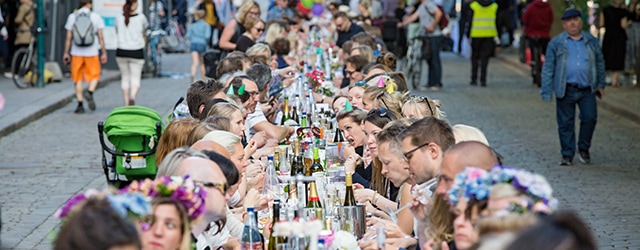
Click To View GDP & Economic Data
Finland did it again. It vaulted from fifth place to the top of the ranking four years ago and seems determined to stay firmly put. Finland has not been immune from the pandemic. Yet, it moved quickly and comprehensively and it handled it better than most of its counterparts.
To take their mind off their problems, Finns also have a lot going for them. This country of very happy people enjoys high standards of living, a thriving cultural life and 3 million very relaxing saunas. With more forest per square mile than any other European nation, many Finns also credit their connection with nature and the outdoors for their satisfaction with life.
To not be selfish, the reigning champion of happiness even offers tips to the rest of the world on how to live better. Along with a lot of swimming, hiking and biking, through its tourism organization it recommends long walks in forests overflowing with berries, mushrooms and wild herbs. You’ve never seen anything remotely like that where you live? That’s exactly point: they are telling you to come visit.
|
Global Rank |
Regional Rank |
Country |
||
| 1 | 1 | Finland | ||
| 2 | 2 | Denmark | ||
| 3 | 3 | Iceland | ||
| 4 | 4 | Switzerland | ||
| 5 | 5 | Netherlands | ||
| 6 | 6 | Luxembourg | ||
| 7 | 7 | Sweden | ||
| 8 | 8 | Norway | ||
| 11 | 9 | Austria | ||
| 13 | 10 | Ireland | ||
| 14 | 11 | Germany | ||
| 17 | 12 | United Kingdom | ||
| 18 | 13 | Czechia | ||
| 19 | 14 | Belgium | ||
| 20 | 15 | France | ||
| 22 | 16 | Slovenia | ||
| 28 | 17 | Romania | ||
| 29 | 18 | Spain | ||
| 31 | 19 | Italy | ||
| 32 | 20 | Kosovo | ||
| 33 | 21 | Malta | ||
| 34 | 22 | Lithuania | ||
| 35 | 23 | Slovakia | ||
| 36 | 24 | Estonia | ||
| 41 | 25 | Cyprus | ||
| 42 | 26 | Latvia | ||
| 43 | 27 | Serbia | ||
| 47 | 28 | Croatia | ||
| 48 | 29 | Poland | ||
| 51 | 30 | Hungary | ||
| 56 | 31 | Portugal | ||
| 58 | 32 | Greece | ||
| 62 | 33 | Moldova | ||
| 65 | 34 | Belarus | ||
| 67 | 35 | Bosnia and Herzegovina | ||
| 75 | 36 | Montenegro | ||
| 79 | 37 | North Cyprus | ||
| 80 | 38 | Russia | ||
| 85 | 39 | Buglaria | ||
| 89 | 40 | North Macedonia | ||
| 90 | 41 | Albania | ||
| 98 | 42 | Ukraine | ||
| 112 | 43 | Turkey | ||
| Source: The UN’s 2022 World Happiness Report. | ||||


